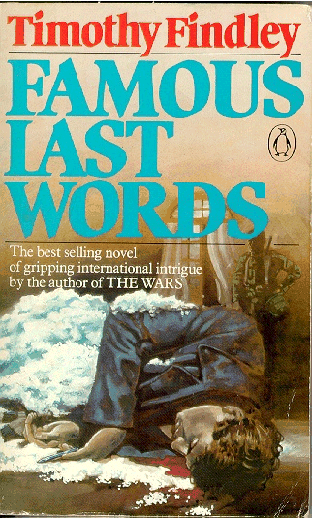Other
War Stories By Timothy Findley
This material was contributed by Chris Boone, Angela Johnston,
Julie Lannon, Adam Tattle, and Brian Vacheresse.
For another
site on this topic.
There are two works by Timothy Findley, besides The
Wars, that are specifically about war. One is the novella, You Went
Away (1996), and the other is the novel Famous Last Words, by
Findley in 1981. Both are fictions written about World War II.
 This latter novel is unique
in that the author used the main character from a poem by Ezra Pound as
his central character. The character is a man named Hugh Selwyn Mauberly
- a bit of a hollow character in the story, but intriguing none the less.
This character, who dies fairly early on in the story, carries one of the
three main plot threads in the story through the memoirs, which he wrote
with a silver pencil, that are found by others after his demise.
This latter novel is unique
in that the author used the main character from a poem by Ezra Pound as
his central character. The character is a man named Hugh Selwyn Mauberly
- a bit of a hollow character in the story, but intriguing none the less.
This character, who dies fairly early on in the story, carries one of the
three main plot threads in the story through the memoirs, which he wrote
with a silver pencil, that are found by others after his demise.
Mauberly is killed, but he had been chased for some time by an "ugly
woman" whose intention it was to murder him. However, the reader does
not know why until near the end of the story.
"There are three main threads that Findley draws out of the superb
symbolic knot he has tied for us at the beginning. One, recounted in the
first person, is the strand of Mauberly's personal reminiscence as he recalls
the bewildered way he shuffled headlong into the elegant and viscous half-world
of right wing politics."
"The second thread is the tale of botched high politics that Mauberly
recounts: the plot to capture Wallis Simpson and her waxwork husband, the
Duke of Windsor, and to transform them into the saviours of fascist Europe."
"The final narrative thread is the present description of the soldiers
who occupy the hotel and of their conflicts and dreams about what they
find there."
Another thread, as noted above, is carried by the group of soldiers
that find Mauberly's body frozen in a mountain hotel after he had been
killed with an ice pick. They read his memoirs, journals, etc. and talk
about what they find, as well as their own conflicts and dreams.
The third and final thread of the story is one of political origin,
and how things get botched up. The soldiers discuss their varying views
on these issues as the story continues.
The style of using three different plot threads is an interesting one.
The author writes in a fragmented style which is confusing at times, partly
because the narrative skips around in time.
The book Famous Last Words discusses many aspects of the 'behind
the scenes' topics of war, especially fascism and other political views.
It raises many varying opinions as the soldiers banter back and forth,
and Mauberly writes some interesting views which aroused questions in the
soldiers. All this in an original story line.

 This latter novel is unique
in that the author used the main character from a poem by Ezra Pound as
his central character. The character is a man named Hugh Selwyn Mauberly
- a bit of a hollow character in the story, but intriguing none the less.
This character, who dies fairly early on in the story, carries one of the
three main plot threads in the story through the memoirs, which he wrote
with a silver pencil, that are found by others after his demise.
This latter novel is unique
in that the author used the main character from a poem by Ezra Pound as
his central character. The character is a man named Hugh Selwyn Mauberly
- a bit of a hollow character in the story, but intriguing none the less.
This character, who dies fairly early on in the story, carries one of the
three main plot threads in the story through the memoirs, which he wrote
with a silver pencil, that are found by others after his demise.